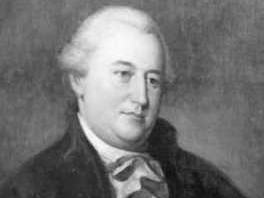Safeguard shows that the Electoral College's critics are right about one thing: it is not simple majority rule—and thank goodness for that.
Disgracing the Electoral College
“I do not, gentlemen, trust you!” thundered Gunning Bedford at the Constitutional Convention. He was a small state delegate, speaking directly to those from the large states. “If you possess the power,” he continued, “the abuse of it could not be checked; and what then would prevent you from exercising it to our destruction?”
The other small state delegates shared his concerns. Their states would not—could not—be free if they were being tyrannized by the decisions of large state citizens. Their concerns came to the fore when a direct national election for President was proposed.
Roger Sherman (CT) worried that the people “will generally vote for some man in their own State, and the largest State will have the best chance for the appointment.” Charles Pinckney (SC) concurred that the “most populous States by combining in favor of the same individual will be able to carry their points.” The Convention ultimately rejected the concept of a national direct election, for fear that small state citizens would have little to no voice in the selection of America’s executive.
If only today’s state legislators would take a few moments to listen to the concerns of their ancestors. They are instead on the verge of rashly joining a movement that will undermine their own freedom.
This so-called National Popular Vote (NPV) effort is halfway toward accomplishing something that was once thought impossible: It could effectively eliminate America’s unique system of electing Presidents, the Electoral College, and implement a national direct election process in its place. NPV shuns the difficult constitutional amendment process and instead claims that this radical change can be made via an interstate compact.
NPV’s compact would require participating states to change the manner in which they award electors. Most states today award electors to the winner of a state’s popular vote. With NPV in place, states would instead award electors to the winner of the national popular vote. In 2004, California would have given its 55 electors to George W. Bush, despite John Kerry’s decisive win in that state. Texas would have given its 38 electors to Barack Obama last year.
Eight states plus D.C., with 132 electoral votes along them, have already approved NPV’s proposed compact. The bill is currently pending in Connecticut, Minnesota, New York, and Oregon (53 electors, total). If these states were to approve the plan, then NPV would be only 85 electors shy of the 270 that it needs to go into effect.
Assuming this plan survives the inevitable court challenges, NPV would ensure that the Electoral College exists only on paper. In practice, the system would be gone. And it would take much of our freedom with it.
“Individual liberty” and “Electoral College” probably aren’t two phrases that you typically utter in the same breath. But they should be. If NPV is successful, then our liberty will suffer a potentially mortal blow. NPV’s direct election proposal guarantees that presidential campaigns will be governed by the needs and priorities of those in densely populated areas. How can voters be free when they have no voice in the selection of their executive?
The Founders sought to avoid exactly this situation. They knew what it was like to be a minority group with insufficient representation in their government. Indeed, they had fought a Revolution because they felt tyrannized in that situation. The Founders, more than anyone, wanted to be sure not only that America was self-governing, but also that all Americans would have an adequate voice in their own government. They sought to protect minorities—especially those in small states—from the tyranny of the majority.
The Electoral College system was one eventual result of these discussions. It ensured that both citizens of large and small states—and the states themselves—would have a voice in the selection of the President. The system operates today as a unique combination of democracy and federalism: The states first hold democratic elections within their own borders; next, a second election among the states themselves (as represented by their electors) is held to determine the identity of the President. Candidates can win only if they demonstrate their ability to win multiple, concurrent victories across many states during this latter election. They are thus incentivized to broaden their base of appeal and to obtain support in many parts of the country, among many different types of voters. Candidates lose when they instead focus too exclusively on one region, state, or urban area. Yes, even if that “one state” is Ohio!
A direct election system would not carry the same set of incentives. NPV would allow a plurality of individuals to dictate the winner of the White House—a majority is not required. The decision made by these individuals would control, even if they are disproportionately found in L.A., San Francisco, and New York. Indeed, as a purely pragmatic matter, candidates would find it more efficient to focus on big cities. Why get a few thousand votes in a rural area when you can get several million in a bigger one? They get more bang for their buck with the latter campaign stop.
The unique combination of democracy and federalism in America’s presidential election system works to protect our freedom by ensuring that every voter, everywhere, matters. No part of the country can be safely ignored. NPV’s more purely democratic presidential election process would instead allow big cities to dominate the election process.
And, as Gunning Bedford observed, what, then, would prevent these urban areas from exercising their power to our destruction?
Tara Ross is the author of Enlightened Democracy: The Case for the Electoral College.
Additional Law and Liberty links: Liberty Law Talk discussion with Gary Gregg “Defending the Electoral College.”



